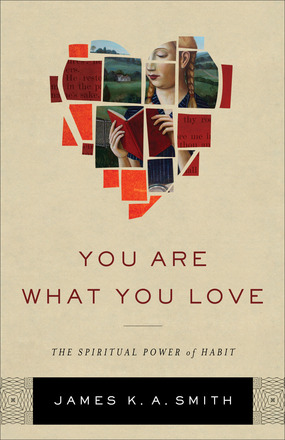You Are What You Love
The Spiritual Power of Habit
James K.A. Smith
Grand Rapids: Brazos Press
Hbk; 224pp; £12.99.
Hbk; 224pp; £12.99.
ISBN 9781587433801
Publisher’s web page here
The nature of idolatry is that we are shaped into the idol’s image: we become like what we worship (Ps 115:8). A graphic illustration of this is provided by the Daily Mirror headline some years ago regarding a young computer hacker:
COMPUTERS TURNED MY SON INTO A ROBOT
Those who make idols will be like them. We image what we worship. This theme is taken up in Smith’s latest book.The book serves as a summary to two of his previous cultural liturgies books: Desiring the Kingdom (Baker Academic, 2009) and Imagining the Kingdom (Baker Academic, 2013).
According to Smith ‘This book articulates a spirituality for culture-makers, showing (I hope) why discipleship needs to be centered in and fueled by our immersion in the body of Christ. Worship is the “imagination station” that incubates our loves and longings so that our cultural endeavors are indexed toward God and his kingdom’ (loc 70-72) Smith argues for the need for a change in our discipleship model, a shift in praxis from a Descartian ‘brain-on-a-stick’ model to a view where discipleship is more than information transfer.
He rightly notes that all models presuppose a view of what it means to be human; how we answer that questions shapes our praxis. The ‘I am what I think’ banking model is flawed. Of course, this is not to be seen as a rejection of thinking, Smith is, after all, a professor of philosophy at Calvin College. Neither is he setting up a head/ heart dualism. He advocates an ‘I love therefore I am’ model. We are what we desire and so we are defined not by knowledge but by what we desire. And this is where worship fits in. As Smith puts it: ‘To be human is to be a liturgical animal, a creature whose loves are shaped by our worship.’ We are what we love and discipleship needs to be seen as a rehabituation of our loves rather than the acquisition of knowledge, this can come through worship. However, the worship needs to embrace liturgies:
‘Christian worship, we should recognize, is essentially a counterformation to those rival liturgies we are often immersed in, cultural practices that covertly capture our loves and longings, miscalibrating them, orienting us to rival versions of the good life. This is why worship is the heart of discipleship’ (Loc 438-441).
What Smith is calling for is not a return to traditional worship and a turning away from contemporary Christian worship - he wants so much more than that. Liturgy is needed to re-orientate our hearts:
‘Our hearts, we’ve said, are like existential compasses and embodied homing beacons: our loves are pulled magnetically to some north toward which our hearts have been calibrated. Our action and behavior—indeed, a whole way of life—are pulled out of us by this attraction to some vision of the good life. Liturgies, then, are calibration technologies. They train our loves by aiming them toward a certain telos’ (889-892)
And importantly:
‘Recognizing worship as the heart of discipleship doesn’t mean sequestering discipleship to Sunday; it means expanding worship to become a way of life.’
The book is iconoclastic - exposing the idols that often lie behind the seeker-sensitive movement, the youth ministry movement and even marriage and the family. Smith makes an excellent case for keeping the youth in with the rest of the congregation and not keeping them apart. He cogently argues that we have ‘created youth ministry that confuses extroversion with faithfulness’.
'And the sad fact is that our youth ministries have treated them as thinking things that need to be entertained when, in fact, what they really crave is not liberation from ritual but rather liberating rituals.'
This is an important book - not only does it makes accessible his cultural liturgies books but provides a framework for rethinking discipleship.
Contents
1. You Are What You Love: To Worship Is Human
2. You Might Not Love What You Think: Learning to Read "Secular" Liturgies
3. The Spirit Meets You Where You Are: Historic Worship for a Postmodern Age
4. What Story Are You In? The Narrative Arc of Formative Christian Worship
5. Guard Your Heart: The Liturgies of Home
6. Teach Your Children Well: Learning by Heart
7. You Make What You Want: Vocational Liturgies
Epilogue
For Further Reading



No comments:
Post a Comment